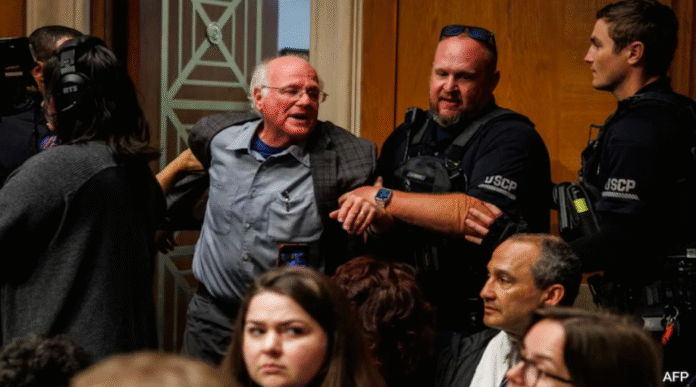By Manha Masood
On Tuesday, May 14, 2025, Ben Cohen, co-founder of Ben & Jerry’s ice cream, was taken into custody after a protest disrupted a hearing of the U.S. Senate Appropriations subcommittee. Cohen and a few other people in the audience got up and started yelling, briefly interrupting the hearing, which was intended to hear testimony from Health and Human Services Secretary Robert F. Kennedy Jr.
Cohen accused congressmen of approving military aid to Israel while slashing domestic social programs such as Medicare and Medicaid, according to witnesses and video footage. The continuous humanitarian crisis in Gaza was a major topic of his remarks. Cohen and six other protesters were immediately escorted out of the hearing room by Capitol Police while being taken into custody and accused of “crowding, obstructing, or incommoding,” a misdemeanor that is commonly used in court cases. Business resumed shortly after the protesters were taken out, with no serious disruptions or injuries reported.
Cohen has a long history of taking part in political protests, and this is just another example of his civil disobedience. He was taken into custody during a protest demanding the release of Julian Assange, the founder of WikiLeaks, in 2023. Cohen has continued to be an outspoken supporter of a variety of causes over the years, such as international human rights, climate change, and campaign finance reform.
Even though he no longer oversees Ben & Jerry’s operations, with the business being acquired by the massive consumer goods corporation Unilever in 2000, Cohen has remained in line with the company’s initial social mission. Ben & Jerry’s gained widespread recognition for its progressive views on social and political issues under his and Jerry Greenfield’s direction. The company has backed causes like environmental sustainability, racial justice, and marriage equality.
The company’s 2021 announcement that it would cease selling its ice cream in Israeli-occupied territories due to human rights violations was one of its most well-known decisions. Although the action caused controversy and international headlines, it was in line with the brand’s decades-long strategy of using business as a vehicle for advocacy.
That legacy is further enhanced by Cohen’s most recent arrest. His actions are consistent with a pattern of nonviolent protest and civil engagement, despite the fact that some may view them as controversial. There is currently no court date announced publicly; Cohen or the other demonstrators detained during the hearing have been given a date. The incident is just one more indication of Cohen’s dedication to activism outside of the ice cream industry.

